- Home
- Mordecai Richler
The Street Page 7
The Street Read online
Page 7
Over the fruit stall:
AN ORANGE ISN’T A BASEBALL. DON’T HANDLE WHAT YOU DON’T WANT. THINK OF THE NEXT CUSTOMER.
Over the cash:
IF YOU CAN GET IT CHEAPER BY THAT GANGSTER ACROSS THE HIGHWAY YOU CAN HAVE IT FOR NOTHING
However, if you could get it cheaper at Blatt’s, Zelda always proved that what you had bought was not as fresh or of a cheaper quality.
The beach was a field of spiky grass and tree stumps. Plump, middle-aged ladies, their flesh boiled pink, spread out blankets and squatted in their bras and bloomers, playing poker, smoking and sipping Cokes. The vacationing cutters and pressers seldom wore bathing suits either. They didn’t swim. They set up card tables and chairs and played pinochle solemnly, sucking foul cigars and cursing the sun. The children dashed in and out among them playing tag or tossing a ball about. Boys staggered between sprawling sun-bathers, lugging pails packed with ice and shouting:
“Ice-cold drinks. Chawk-lit bahs. Cig’rettes!”
Occasionally, a woman, her wide-brimmed straw hat flapping as she waddled from table to table, her smile as big as her aspirations, gold teeth glittering, would intrude on the card players, asking – nobody’s forcing, mind you – if they would like to buy a raffle in aid of the Mizrachi Fresh Air Fund or the J.N.F. Naked babies bawled. Plums, peaches, watermelons were consumed, pits and peels tossed indiscriminately on the grass. The slow yellow river was unfailingly condemned by the Health Board during the last three weeks of August, when the polio scare was at its height. But the children paid no attention. They shrieked with delight whenever one of their huge mothers descended into the water briefly to duck herself – once, twice – warn the children against swimming out too far – then, return, refreshed, to her poker game. The French Canadians were too shocked to complain, but the priests sometimes preached sermons about the indecency of the Jews. Mort Shub said, “Liss’n, it’s their job. A priest’s gotta make a living too.”
At night most people crowded into the dancehalls at Zimmerman’s and Blatt’s. The kids, like Noah, Gas, and Hershey, climbed up the windows and, peashooters in their mouths, took careful aim at the dancers’ legs before firing. Fridays, the wives worked extremely hard cleaning and cooking for the sabbath. Everybody got dressed up in the afternoon in anticipation of the arrival of the fathers, who were met in Shawbridge, most of them having arrived on the 6:15 excursion train. Then the procession through Shawbridge, down the hill and across the bridge, began; an event that always horrified the residents of the village. Who were these outlandish, cigar-chomping men, burdened with watermelons and Kik bottles, salamis and baskets of peaches, yelling at their children, whacking their wives’ behinds and – worst of all – waving merrily at the sombre Scots who sat petrified on their balconies?
Noah showed up last.
“Pinky’s Squealer wants to come with us,” Gas said.
“Did you tell him where we’re going?”
“Ixnay. You think I’m crazy?”
“He’s got a quarter,” Hershey said.
Pinky’s Squealer showed Noah the quarter.
“All right,” Noah said.
Old Annie, shaking her head sadly, watched the four boys start out across the fields. Noah led. Hershey, who came next, was Rabbi Druker’s son; a scrawny boy with big brown eyes. His father had a small but devoted following. Hershey hung around the synagogue every evening and stopped old men on their way to prayers. “Give me a nickel and I’ll give you a blessing.” He didn’t do too badly. “I’m holy as hell,” he told Noah one evening.
Gas, trailing behind, was plump, fair-haired and freckled.
The boys filed down the dirt road that led to the Nine Cottages, the sun beating against their brown bodies. They passed Kravitz’s cottage, with its smelly outhouse, Becky Goldberg’s place, and the shapeless shack that housed ten shapeless Cohens.
The tall grass at the foot of the mountain was stiff and yellow and made you itch. There were also mushy patches where the bulrushes grew, but they avoided those. The sheltering trees cooled the boys, but they had a long climb ahead of them. The soft plump ground they tramped on was padded with pine cones, needles, and dead leaves. Sunlight filtered deviously among the birch and maple and fir trees and the mountain had a dark damp smell to it. There was the occasional cawing of crows, they saw two woodpeckers and, once, a humming-bird. They reached the top of the mountain about one o’clock and sat down on an open patch of ground to eat their lunch. Gas chased around after grasshoppers, storing them in an old mayonnaise jar that had two holes punched in the top. After they had finished their sandwiches they started out again, this time down the other side of the mountain. The foliage thickened and in their eagerness to get along quickly, they scratched their legs and arms in the bush, stumbling into the occasional ditch concealed by leaves and bruising their ankles against jagged stones. They heard voices in the distance. Noah, who had been given the BB gun, pulled back the catch. Gas scooped up a rock, Hershey unstrapped his scout knife. “We’ll be late for shabus,” Pinky’s Squealer said. “Maybe we should go back?”
“Go ahead,” Hershey said. “But watch out for snakes, eh?”
“I didn’t say anything.”
Voices, laughter too now, came splashing through the trees. The ground began to level off and, just ahead, they made out the beach. There were real canoes, a diving-board, and lots of crazy-coloured umbrellas and deck-chairs. The boys approached the beach cautiously, crouching in the bushes. Noah was amazed. The men were tall and slender and the women were awfully pretty, lying out in the sun there, just like that, not afraid of anything. There was no yelling or watermelon peels or women in bloomers. Everything was so clean. Beautiful, almost.
Gas was the first to notice the soft drink stand. He turned to Pinky’s Squealer. “You’ve got the quarter. Go get us Pepsis.”
“Gas should go,” Hershey said. “He’s the least Jewish-looking of the gang. Look at his nose – Christ! They’ll take him for a goy easy.”
“You can have my quarter.”
“Aw, go water your tea-kettle,” Gas said. “Maybe I don’t look as Jewish as you or Noah, but they can always tell by pulling down your pants …”
They all giggled.
“It’s not so funny,” Hershey said. “That’s how they found out about my uncle, who was killed in Russia.”
“You’re all chicken,” Noah said. “I’m going. But I’m having my Coke right out there on the beach. If you want anything to drink you’ll have to come too.”
A convertible Ford pulled away and that revealed the sign to them. Gas noticed it first. Suddenly, he pointed. “Hey, look!”
THIS BEACH
IS
RESTRICTED
TO GENTILES
That changed everything. Noah, his excitement mounting, said they would hang around until evening and then, when the beach was deserted, steal the sign.
“Yeah, and walk back in the dark, eh?” Pinky’s Squealer said. “It’s Friday, you know. Aint your paw coming?”
Gas and Hershey looked puzzled. Both of them had been forbidden to play with Noah by their mothers. Pinky’s Squealer made sense, but if Noah intended to stay they would look cowardly if they left him behind. Noah certainly wanted to stay. Having his father up for the weekend usually meant two days of quarrelling.
“Aw, in a hundred years we’ll all be dead,” Gas said.
Pinky’s Squealer waited, kicking the stump of a tree petulantly. “If you come with me, Hershey, you can have my quarter.”
“Watch out for snakes,” Hershey said.
Pinky’s Squealer ran off.
The afternoon dragged on slowly, but at last the sun lowered and a strong breeze was starting up. Only a few stragglers remained on the beach.
“Is a Gentile a Catholic and a Protestant too?” Hershey asked.
“Yeah,” Noah said.
“But they’re different,” Hershey said, “aren’t they?”
“Different,” Gas said
. “You know the difference between Hitler and Mussolini?”
Noah decided that as it was getting late they would have to risk it, stragglers and all. The few couples who remained were intent on each other and wouldn’t notice them if they were cunning. Noah said that he and Gas should stroll out on to the beach, approaching the sign from different directions, nonchalantly. It didn’t look as if it was stuck very solidly into the sand. Hershey was to holler if he saw anybody coming for them. He had stones and the BB gun.
So the two boys sauntered innocently out on to the beach. Noah whistled. Gas pretended to be searching for something. The wind kicked up gusts of sand and the sun, sinking still lower, was a blaze in the opposite hills. Suddenly, frantically, the two boys were yanking at the sign. Gas shook with laughter, tears rolling down his cheeks. Noah cursed. They heard, piercing the stillness, a high-pitched shout. “Look out!”
Gas let go, and ran off. Flying for the woods.
“Hurry!”
Noah persisted. A man, waving a canoe paddle, was running toward him. Noah gave one last, frenzied tug, and the sign broke free. The man was about twenty feet away now, wielding his paddle viciously. His eyes were wild. “You little son of a bitch!”
Noah swerved, racing for the bushes. A shower of pebbles bounced off his back. The paddle swooshed through the air behind him. But he was fast. Once in the bushes he scampered off, zigzagging into the mountain. He ran and ran and ran. Finally, clutching the sign in his hands, he tumbled down on the pine needles, his heart hammering.
Noah couldn’t find Gas anywhere, but Hershey loomed up from behind a rock. Darkness fell quickly and they soon realized they were lost. Lost, and without a flashlight. Possibly, they were moving in circles. For all they knew they might come out of the woods again at Lac Gandon.
Noah and Hershey had stopped climbing, they had reached a level bit of ground and then all at once they heard many voices. Light beams shot through the darkness. Hastily, the boys concealed the sign under a mess of decaying leaves and climbed up the nearest tree – their pockets filled with stones. The voices and probing lights came nearer.
“Hershey!”
“Noah!”
“Boys!”
“HALLO!”
The boys began to quake with laughter. Every able-bodied man in Prévost must have been out on the mountain that night, armed with pitchforks, rakes, clubs and baseball bats. Noah and Hershey had never thought they’d be grateful to Pinky’s Squealer, but they were that Friday night. They slid down the tree and uncovered the sign and that was their night of glory in Prévost. Nothing was too good for them. Sunday morning Noah, Hershey, Mort Shub, and Gas planted the sign on their own beach. When the others came out to swim, they read:
SIX
Bambinger
WE NEEDED MONEY. But we could not, like the Isenbergs next door, put a “Room To Let” sign in the window. We had standards to maintain.
“Taking in a refugee, a single man,” my mother argued, “would help to fight human suffering. It might also mean a husband for Cousin Bessie, poor thing.”
So in November, 1942, a phone call was made to the proper agency, and we got our first roomer, a refugee, without advertising. Herr Bambinger was a slight, stooping man with a shiny bald head and almost no chin. He wore thick glasses with steel frames and, even though he rolled his own cigarettes, he used a tortoise-shell cigarette holder.
“I guess,” my mother said, “you’re thinking of settling down. You’ll be looking for a wife.”
“You bet your bottom dollar he is,” my father said.
On Friday Cousin Bessie was produced at dinner and on Saturday my parents cornered Herr Bambinger.
“Beauty,” my mother said, “is only skin deep.”
“Ach, so.”
“What a man wants in a wife is somebody steady,” my father said, offering Herr Bambinger a shot of apricot brandy. “Somebody with a little something in the bank.”
Herr Bambinger didn’t, like the other refugees, drink black coffee endlessly at the Old Vienna and pontificate about what a dull, uncultured country Canada was. Bambinger spent most of his evenings smoking in the dark in his room, the back bedroom. He wrote a prodigious number of letters, always filling the rice paper pages from top to bottom with the smallest, tightest handwriting I had ever seen. The letters went to the International Red Cross and refugee organizations and camps all over the world, but nothing ever came for him unless it was his own letters returned or copies of the Aufbau. Bambinger took a considerable interest in me. He convinced my mother that comic books were a bad influence. Superman, he said, was a glorification of fascism, and the Batman and Robin had a thinly – “very thinly,” he said – disguised homosexual relationship. “I don’t advise,” he’d say to my mother, “that the boy should go without a scarf in such coldness.” A couple of days later it was, “The boy shouldn’t keep the elbows on the table when he eats.” Or, another time, as he switched off the radio abruptly, “A boy can’t do his studies and listen to the wireless at the same time.”
My parents believed that Herr Bambinger had my welfare at heart and when I protested against his intrusions they disciplined me. One Saturday afternoon my mother forced me to go out for a walk with Herr Bambinger.
“Why should I miss the ball game, but?” I asked.
“The poor man has a wife and child of your age and he doesn’t know where they are or if they’re still alive.”
Bambinger – vengefully, I thought – led me to the art museum on Sherbrooke Street. “It is never too early,” he said, lighting a cigarette, “for one to learn appreciation of the arts.”
“How’s about a cig for me?”
“Nicotine is bad for growing boys.”
“If you’re too cheap to butt me just say so.”
“You are not only stupid. You are very impudent. If you were my boy it would not be so. I’d teach you respect.”
“Well, I’m not your boy, see.”
When Bambinger and I finally did tangle it was over coffee. Coffee, if you remember, was rationed during the war, and at the age of twelve a boy became entitled to a share. There were coupons for it provided in this book. I had waited impatiently for my twelfth birthday and the day after it I demanded a cup. My mother smiled a little. But Bambinger shot her a warning glance and regarded me reproachfully across the table.
“You know you’re not allowed to drink coffee,” my mother said. “You’re still a child.”
My sister grinned and took a long sip from her cup.
“As far as the legally elected government of Canada is concerned I am, as of yesterday, allowed to drink coffee.”
“The government is full of anti-Semites,” my father pronounced compulsively.
But I could see that my mother’s resolve was weakening.
“One cup,” I pleaded. “Would it break your heart?”
“Your mother’s right. Coffee is bad for a growing boy.”
Staying up late, according to Bambinger, would also stunt my growth. As did evenings spent at the Park Bowling Academy.
“This is family business, so keep your big nose out of it.”
“Apologize to Mr. Bambinger immediately.”
“Either I get my legal ration or I destroy my coupons.”
“You will do no such thing. Now apologize to Mr. Bambinger.”
Bambinger smiled mockingly at me, waiting.
“Well, the hell with you,” I shouted, turning on Bambinger. “Why’d you run away from Hitler, you chicken? Couldn’t you have stayed behind and fought in the underground? Wouldn’t that have been better than running out on your wife and kid to save your own skin?”
My mother slapped me.
“Okay,” I said, bolting. “I’m leaving home.”
Outside, it was raining. Fists jammed into my windbreaker pockets, hastily packed kitbag bouncing against my back, I jogged to the Park Bowling Academy, where Hershey was spotting pins. “Hey,” I said, “how’d you like to run away from home
with me?”
Hershey wiped the sweat from his forehead, pondering my proposition. “Cancha wait until Monday? We’re having latkas for dinner tomorrow.”
Walking back to St. Urbain with Hershey, I told him about my troubles with Bambinger. It began to rain harder and we sheltered under a winding outside staircase. “Hey, would you do me a favour?” I asked.
“No.”
“Thanks.”
“What do you want me to do?”
I asked him to ring my doorbell and tell my mother I had fainted or something. “Say you found me lying in the gutter.”
“You’re chicken. I knew it. You’re not running away from home.”
Hershey gave me a shove and I scooped up my kitbag to slug him. He began to run. It was almost ten-thirty, the rain had turned to snow.
“You’ve come back,” my mother said, seemingly overjoyed.
“Only for tonight.”
“Come,” she said, taking me by the hand. “We’ve just had the most wonderful news.”
Bambinger was actually dancing round the dining room table with my sister. He wore a paper hat and had let his glasses slip down to the tip of his nose. “Well,” he said, “well, well, the prodigal returns. I told you not to worry.”
Bambinger smiled and pinched my cheek, he pinched it very hard before I managed to break free.
“They were going to send out the police to look for you.”

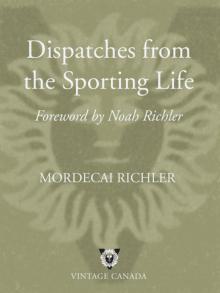 Dispatches From the Sporting Life
Dispatches From the Sporting Life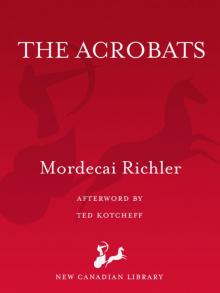 The Acrobats
The Acrobats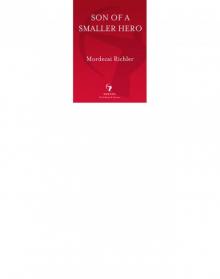 Son of a Smaller Hero
Son of a Smaller Hero Jacob Two-Two-'S First Spy Case
Jacob Two-Two-'S First Spy Case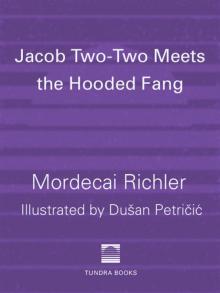 Jacob Two-Two Meets the Hooded Fang
Jacob Two-Two Meets the Hooded Fang Jacob Two-Two and the Dinosaur
Jacob Two-Two and the Dinosaur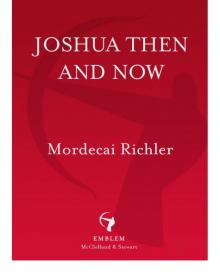 Joshua Then and Now
Joshua Then and Now Solomon Gursky Was Here
Solomon Gursky Was Here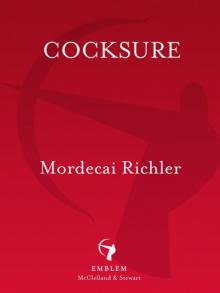 Cocksure
Cocksure The Street
The Street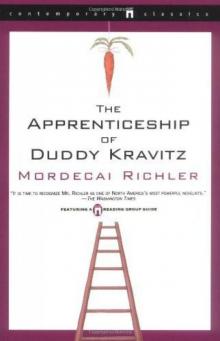 The Apprenticeship of Duddy Kravitz
The Apprenticeship of Duddy Kravitz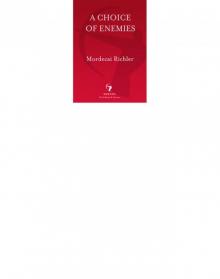 A Choice of Enemies
A Choice of Enemies Barney's Version (Movie Tie-In Edition)
Barney's Version (Movie Tie-In Edition)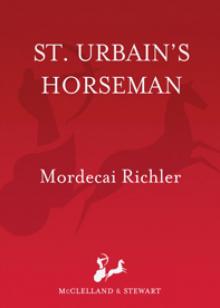 St. Urbain's Horseman
St. Urbain's Horseman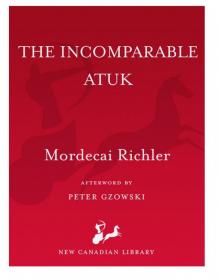 The Incomparable Atuk
The Incomparable Atuk Barney's Version
Barney's Version